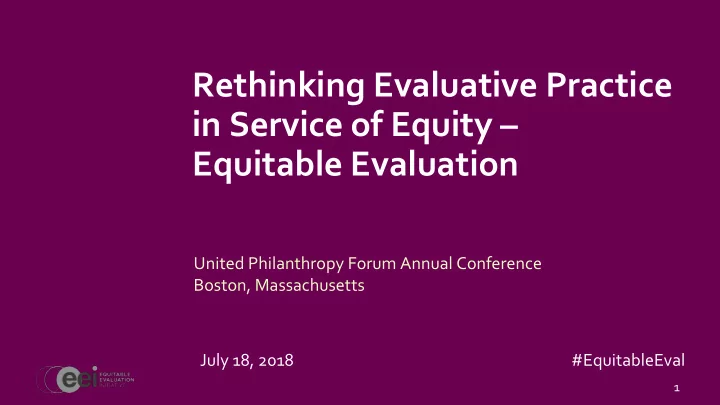

Rethinking Evaluative Practice in Service of Equity – Equitable Evaluation United Philanthropy Forum Annual Conference Boston, Massachusetts July 18, 2018 #EquitableEval 1
The History of Evaluation in US Philanthropy Evaluation is a child of Evaluation in foundations is government and conceived in a narrow behavioral sciences. context by a few individuals. Questions regarding the Evaluators needed a new evaluation use and purpose market. are a constant thread. Evaluation and foundations have a history of coming Sources:Hall, P. D. (2003); Hall, P. together and pushing D. (2004); Hall, P. D. (2006).Hogan, R. L. (2010); Center for Effective evaluation practice Philanthropy & Center for Evaluation Innovation. (2016) 2
The Invitation Reimagine YOUR ROLE in shaping the purpose & practice of evaluation to reflect the values and intentions that drive philanthropy and nonprofits.
equitable evaluation (Emerging Principles , Spring 2018) Evaluative work should be Evaluative work can designed & implemented in Evaluation work is in service and should answer critical a way that is commensurate of and contributes to equity. questions about the: with the values underlying equity work: • Production, consumption, and • Effect of a strategy on different • Multi-culturally valid management of evaluation and populations • Oriented toward participant evaluative work should hold at its ownership • Effect of a strategy on the core a responsibility to advance underlying systemic drivers of progress towards equity. inequity • Ways in which history and cultural context are tangled up in the structural conditions and the change initiative itself. 5
Why it Matters RACSIM EVALUATION THE STAKES • is insidious and • currently reflects a • are too high for permeates what we way of defining, evaluation not to be believe to be true and describing and an instrument of objective analyzing the world change and in service based in history of a greater good, equity • created in a particular moment, informed by the values, experiences and needs of a small group of middle-aged white heterosexual male 6
A Paradigm Shift… HEARTS + MINDS Is what we’re really talking about STRUCTURES BEHAVIORS ABOVE: Wheel of Change for Transformation, Robert Gass 7
Equity 1. MEANS — Deep equity means working toward outcomes in ways that model dignity, justice, and love without re-creating harm in our structures, strategies and working relationships — MAG 2. ENDS — Equity is the absence of avoidable or remediable differences among groups of people, whether those groups are defined socially, economically, demographically, or geographically. — World Health Organization 8
Individual/Pairs 1. How does current evaluation philosophy align with ee?
Evaluative Inquiry Cycle FOCUSING the Inquiry: FRAMING the Inquiry : • Prioritize key questions • Clarify purpose • Determine data collection methods • Surface assumptions • Review/revise, develop data collection • Articulate goals & objectives tools and administration protocols • Assess organizational capacity • Integrate data collection with organizational culture/program • Identify key questions practice APPLYING the Learning: • Analyze and interpret data • Use findings to: CONDUCTING the Inquiry: - Inform program and strategy work • Pilot tools/administration and • Modify organizational systems and modify as needed structure • Collect information • Make decisions around future investments • Communicate preliminary ideas and strategies about how findings will be • Contribute to individual growth and educate communicated and utilized the field • Inform further evaluative inquiry activities Adapted from Preskill and Torres 1999
The Challenge: Change is Hard Resist simplicity and Unlearn what the quick fix. Make values we believe to be explicit truth, evidence Move BEYOND and rigor methods and demographics 11
Evaluative Inquiry Cycle – Integrating Equity FRAMING the Inquiry : FOCUSING the Inquiry: • How do your organizational values • Who determines the questions? and intentions influence? • How are • In what way does equity show up? historical/structural/systemic Both in process and focus? What characteristics of a 3 rd party patterns and policies named and • explored? evaluator can support ee? • How are (and who) determines data • Who will “own” the data and collection methods? findings? • How are reflect different ways of knowing and truths reflected? APPLYING the Learning: • Who and how is sense made of the data? CONDUCTING the Inquiry: • How are findings used and by whom? • How is data collected? How will the process reflect • In what ways will findings inform how multiple perspectives, history, context, et.c? org thinking about and engaged in • How will the data be analyzed and through what equity work? lens? • In what ways are findings shared with • In what ways does the process support equity? others to advance understanding? Adapted from Preskill and Torres 1999
Pairs/Small Group 1. How does current evaluation philosophy align with ee? 2. What (or who) would need to shift to move towards ee?
Advancing Equity through Evaluation June 2019 Design Challenge - What is the mindset/practice you wish to shift in service of equitable evaluation? Be SPECIFIC Opportunity (next 3 Sources of Support months) What I Will Try… Insights Challenges/Barriers
Small Group/Full Group 1. How does current evaluation philosophy align with ee? 2. What (or who) would need to shift to move towards ee? 3. How will you move ee forward internally and among members?
16
Equitable Join Us Evaluation Initiative launch late July EE Project Website: https://www.equitableeval.org/ Twitter Hashtag: #EquitableEval
Recommend
More recommend